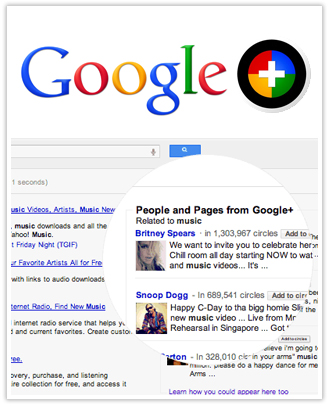Google acquires more private with search results
Jan 27, 2012, by admin
 Google is sieving through the photos and commentary on its flourishing social network so its Internet search results can comprise more personal information.
Google is sieving through the photos and commentary on its flourishing social network so its Internet search results can comprise more personal information.
The further personal strokes that began to squash Tuesday mark another step toward one of Google’s most ruthless goals. The Internet search leader ultimately hopes to know sufficient about each of its users so it can tailor its results to fit the unique benefits of each person looking for something.
Dissimilar people should start seeing dissimilar search results more often now that Google Inc. is trade in content from its 6-month-old Plus service, a product that the company initiated in an attempt to counter the popularity of Facebook’s online hangout and Twitter’s short-messaging hub. Google’s main search results page also will start highlighting more content from an older online photo service called Picasa.
Facebook and Twitter pretense a threat to Google because they don’t allow Google’s search engine to log the rush of photos, links and surveillances tumbling through those services. That’s troublesome to Google because its search engine could become less useful if its system can’t analyze what people are signaling is important to them so those preferences can be factoring into the results.
Google is undertaking that challenge with an addition to its results called “Search, plus Your World.”
The feature will be routinely turned on beginning Tuesday for all English-language searches made by users logged into Google. Turning off the personal results everlastingly will require changing a setting in Google’s personal preferences. The personal results can also be prohibited on a search-by-search basis by clicking on an icon of the globe on the results page (the personal results will be signified by a button featuring a human’s silhouette).
If the latest formula works as Google supposes, the search results will comprise relevant information picked from the requestor’s Plus account. For example, a query about the San Francisco 49ers might comprise links and comments made about the football team by other people in one of the social circles on the user’s Plus account. A search request that comprises the name of a dog owned by the user or a friend might turn up photos of the pet that have been posted on Plus and Picasa.
“This is going to release a entire new way in search,” said Ben Gomes, a Google fellow.
Google isn’t the first to do this. Microsoft Corp.’s Bing search engine has been withdrawal some of the favorites and other information shared on Facebook since May. But Google’s stress on more personal results figures to attract more attention because its search engine is so dominant. It handles about two-thirds of the Internet search requests made in the U.S. while Bing processes less than one-third, comprising the activity that it comes through a partnership with Yahoo Inc.
Facebook, though, has greater imminents into personal tastes. That’s because its nearly 8-year-old social network swanks more than 800 million users who share more than 1.5 billion photos alone each week. In October, Google said Plus had more than 40 million users. Google hasn’t updated the information
since then, although some exterior studies have estimated Plus began the new year with 60 million to 70 million users.
Some of Google’s alters may help poke more people into joining Plus.
As part of Tuesday’s extension, the profile pictures of Plus accountholders will appear in the drop-down suggestions on Google’s search box. So when typing in “Mary,” you may see those named Mary in your circle along with those Google believes you’d find interesting.
In another twist, searches on general topics such as “music” and “sports,” will produce suggestions on people, companies and places that have Plus accounts.
While Google is hoping the accumulation of more personal results will make its search engine even more functional, the changes also could spook some people as they understand how much information is being accumulated about them. Google tried to minimize privacy worries by recently switching to technology that encrypts all its search results to defend the information from slipping out.
Previous solitude missteps by both Google and Facebook resulted in both companies entering into conclusions with the U.S. Federal Trade Commission. The FTC agreements need Google and Facebook to submit to exterior inspects of their solitude carry outs every other year.

